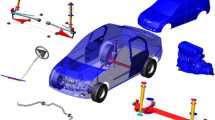Abstract
Robust design for the primary suspension of a railway vehicle was performed according to the optimization of 10 dynamic responses representing driving safety and ride comfort, in which response surface models (RSMs) from the design of experiments (DOEs) were applied. To evaluate the probabilistic feasibility of robustness, an intensive computational process is mandatory. In the present study, the authors utilized the first-order Taylor series expansion to reduce the computational burden associated with a probabilistic feasibility evaluation, thus easily obtaining both an individual mean and variance of constraints. To overcome the difficulty of optimizing the mean and probabilistic variances for the 10 dynamic responses, a process capability index (Cpk) was introduced, which shows the mean value and scattering of the product quality to a certain extent and normalizes the objective functions irrespective of varying dimensions. Consequently, the robust design to optimize the 10 dynamic responses minimized the Cpk subjected to the constraint of Cpk ≥ 2, which satisfied 6σ. The proposed method improved the Cpk that violated the constraints obtained by the RSMs from DOEs and minimized the variance of the Cpk.
Similar content being viewed by others
References
M. S. Phadke, Quality Engineering Using Robust Design, Prentice Hall, Englewood Cliffs, (1989).
W. Chen, J. K. Allen, K.-L. Tsui and F. Mistree, A procedure for robust design: minimizing variations caused by noise factors and control factors, Transactions of the ASME, 118 (1996) 478–485.
A. Parkinson, C. Sorensen and N. Pourhassan, A general approach for robust optimal design, Journal of Mechanical Design, 115(1) (1993) 74–80.
V. E. Kane, Process Capability Indices, Journal of Quality Technology, 18(1) (1986) 41–52.
C. K. Park, K. K. Lee, T. H. Lee and D. S. Bae, Optimization of a train suspension using Kriging model, Trans. of the KSME (A), 27(6) (2003) 864–870.
R. H. Myers and D. C. Montgomery, Response surface methodology: Process and product optimization using designed experiments, John Wiley & Sons, New York, 1995.
A. Vlahinos and S. Kelkar, Designing for six-sigma quality with robust optimization using CAE, International Body Engineering Conference, SAE paper no. 02IBECA-28, Paris, France (2002).
Author information
Authors and Affiliations
Corresponding author
Additional information
Kwang-Ki Lee received his B.S. and M.S. degrees in Mechanical Engineering from Hanyang University, Korea, in 1986 and 1988, respectively. He is a Ph.D candidate in Hanyang University, Korea. Lee is currently a Consulting Division Director of VP KOREA, Korea. Lee’s research interests are DOEs, meta-modeling, and multi-objective robust optimization.
Seung-Ho Han received his B.S. and M.S. degrees in Mechanical Engineering from Hanyang University, Korea, in 1989 and 1991, respectively. He then received his Doctor degree from RWTH Aachen, Germany, in 1996. Dr. Han is currently a Professor at the Dept. of Mechanical Engineering at Donga University in Busan, Korea. Dr. Han’s research interests include reliability based design, and fatigue life extension technique.
Rights and permissions
About this article
Cite this article
Lee, KK., Park, CK. & Han, SH. Robust design of railway vehicle suspension using a process capability index. J Mech Sci Technol 24, 215–218 (2010). https://doi.org/10.1007/s12206-009-1131-8
Received:
Revised:
Accepted:
Published:
Issue Date:
DOI: https://doi.org/10.1007/s12206-009-1131-8




